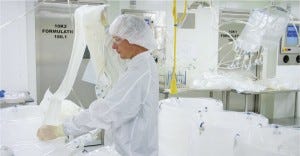- Sponsored Content
Global Biotech Expansion Demands Drive Local Manufacturing NeedsGlobal Biotech Expansion Demands Drive Local Manufacturing Needs
August 15, 2014

As major economies in the Asia–Pacific region continue to increase focus on healthcare modernization, new opportunities for both global and local biopharmaceutical companies are being created. Such opportunities are driving demand for local sourcing of raw materials to ensure security of supply.
Modernization of Healthcare Drive Opportunities for Biopharmaceutical Firms
Recent modernization of healthcare by governments has seen China pledge 124 billion to improve its healthcare system to provide insurance to 90% of its residents (1). South Korea introduced a biosimilar regulatory pathway consistent with EMA guidelines (2) and launched its Bio-Vision 2016 initiative to invest 14.3 billion in 10 years (3). India issued its guidelines on biosimilars (4) to provide a pathway for approval. And Singapore continues to invest in R&D with its Agency for Science, Technology and Research by signing a five-year strategic agreement with GSK to develop evidence-based formulations targeted specifically for emerging markets (5).
Trends in Biopharmaceutical Industry Create Opportunities
With about 80 billion in revenues under threat as a number of biologics are due to go off-patent in the next five to six years, the dynamics of the biopharmaceutical industry are shifting and creating new opportunities. For example, biopharmaceutical firms are pursuing a biobetters strategy to defend existing patent positions or are exploring partnerships with biosimilars manufacturers in emerging markets such as India, China, and South Korea.
In establishing biosimilar partnerships, biopharmaceutical companies are making capital infrastructure investments with their APAC partners. Astra Zeneca is completing a 200 million manufacturing plant in Taizhou (6), and Novo Nordisk is investing 128M on a factory in Tianjin (7). GSK opened a vaccine plant to produce bulk ingredients for vaccine manufacturing, Roche recently opened a new facility to manufacture its Lucentis product, and Amgen announced plans to invest 200 million to build an antibody manufacturing facility.
Creating Local Supply
In 2011, BCC reported that the global market for media products was 900 million and growing at 9.5%, whereas Asia was growing at 20% and set to represent 26% of the global market for media products by 2016. As a global supplier of bioprocess products, technologies and insights, GE Healthcare is actively supporting the rapid pace of growth of the biopharmaceutical industry in the Asia–Pacific region.
Located in close proximity to the Tuas Biomedical Park in Singapore is GE Healthcare’s new 3,000 m2 current good manufacturing practice (CGMP) powder media facility. This 10M investment in local production capacity for critical raw materials enables GE Healthcare to offer its global customers redundant manufacturing capacity and enhanced security of supply. Such comprehensive support is enabling biopharmaceutical companies to meet growing global healthcare demands.
References
1. http://www.bloomberg.com/apps/news?sid=aXFagkr3Dr6s&pid=newsarchive
2. http://www.biosimilars.ca/docs/Evalutation_Guidelines_forBiosimilars.pdf
3. PriceWaterHouseCoopers. Leadership in Affordable Therapeutic Products: A BioPharma Strategy for India, July, 2010.
4. http://www.biosimilarnews.com/indian-biosimilars-guidelines
5. https://www.ices.a-star.edu.sg/press-releases/glaxosmithkline-and-astarstar%E2%80%99s-institute-of-chemical-engineering-and-sciences-to-develop-new-medicines-for-emerging-markets.aspx
6. http://www.telegraph.co.uk/finance/newsbysector/pharmaceuticalsandchemicals/8818673/AstraZeneca-to-invest-record-breaking-200m-in-Chinese-factory.html
7. http://www.pharmaceutical-technology.com/projects/novo-tianjin/
Kiran Chin is associate marketing director at HyClone Cell Culture at GE Healthcare Life Sciences, 1-781-708-1969;
[email protected].
GE and GE monogram are trademarks of General Electric Company. ©2014 General Electric Company. All rights reserved. First published in July 2014.
You May Also Like






